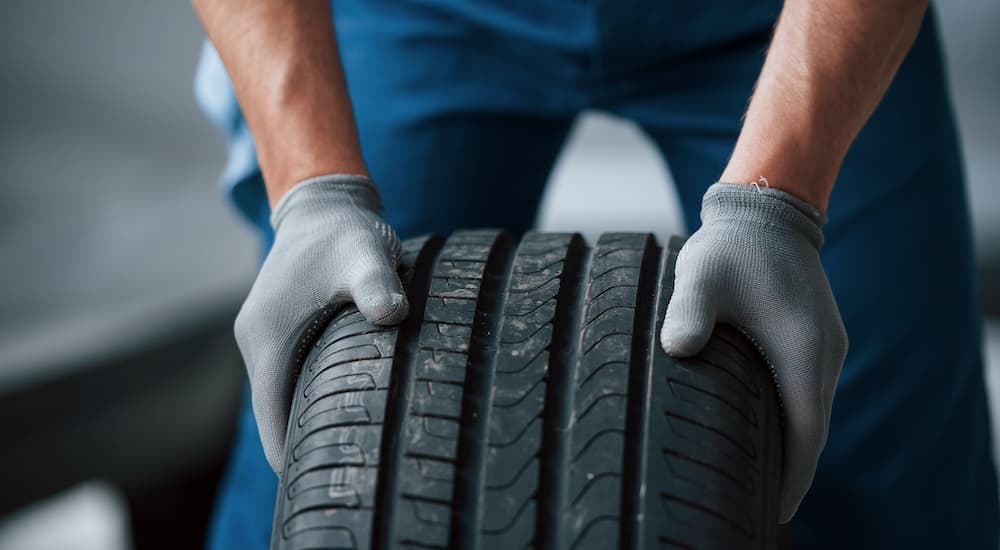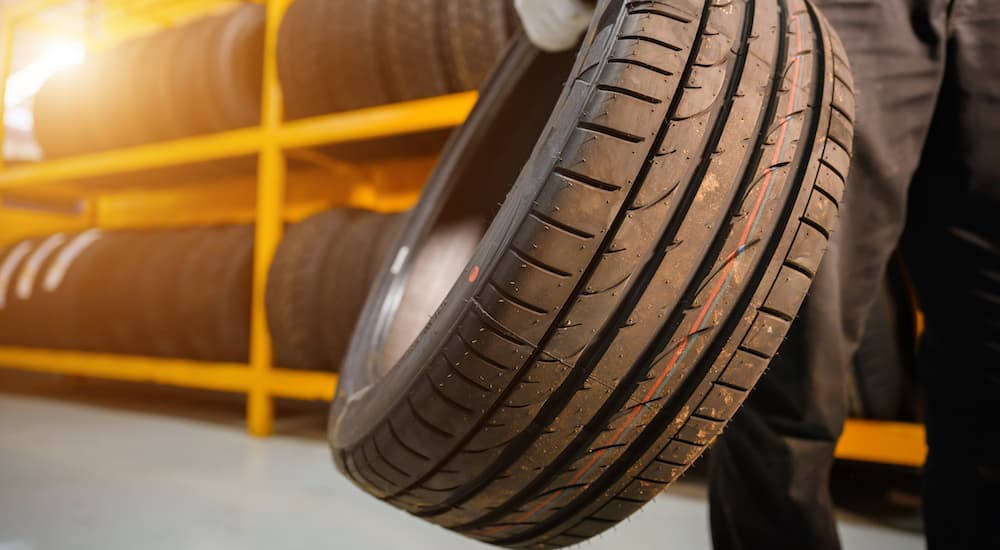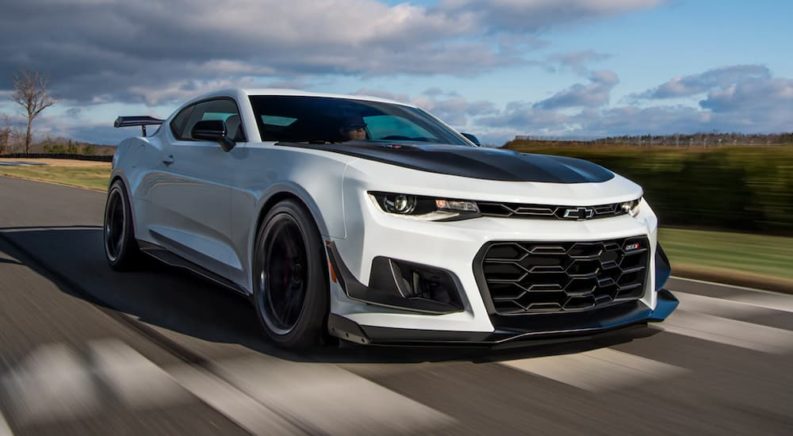Shopping for tires can be overwhelming, especially considering the number of options available. How do you choose between all-season and summer tires? How do you even know where to start your search? If you have been considering summer tires for sale near you, then get ready to learn everything you need to know. We’re your tire authority and are here with all the details about summer tires, how they perform, and why you might want them on your vehicle.
Summer Tires: The Basics
All tires are made from rubber compounds; how those compounds respond to temperature determines how your vehicle will perform. For example, winter tires are made from a unique rubber compound that remains flexible in frigid temperatures. Whereas the rubber in a summer tire will become rigid, the rubber in a winter tire flexes to maximize traction in sleet, snow, and ice. As a result, winter or snow tires are vital in areas where temperatures are consistently below freezing in the winter months.
Summer tires fall on the opposite end of the spectrum, and all-season tires fall somewhere in the middle. All-season tires don’t handle extreme cold or heat well, performing adequately in mild climates and conditions. As a result, all-season tires are typically the go-to for most passenger cars, SUVs, and light-duty trucks. So, where does that leave summer tires?
Summer tires are made of a rubber compound that, unlike winter tires, is designed for maximum traction in warm weather. While winter tires lose their rigidity in these conditions, summer tires perform their best. Their unique, shallow tread design, simple tread pattern, and solid ribbing optimize traction to provide exceptional road grip. That’s why summer tires are a top choice for those performance-oriented drivers looking for better acceleration, braking, and cornering.

Answering Your Questions: Summer Tire FAQs
Summer tires can be misleading because the name implies they’re only suitable for one season. Does this mean you must buy four sets of tires to navigate winter, spring, summer, and fall? Fortunately, no. We’re here to answer those questions and more with a quick guide to some of our most frequently asked questions.
Can I Use Summer Tires Year-Round?
It all depends on the climate where you live. For example, a Florida driver may find a set of summer tires ideal for year-round driving since they live in an area that rarely drops below 50 degrees. However, a driver who calls North Dakota home will likely need to swap their summer tires for a set of all-season or snow tires as the temperatures plummet.
How Do Summer Tires Improve Speed and Handling?
Summer tires are often known as performance tires because of their shallow tread design that improves traction on dry roads. They’re also made of a special rubber compound that softens in extreme temperatures, allowing them to flex to optimize traction and dissipate heat. As a result, summer tires enhance your vehicle’s performance by sharpening its responsiveness, acceleration, and stopping power.
Which Tires Wear Faster: Summer or All-Season?
All-season tires are designed as a hybrid, blending aspects of winter and summer tires for drivers who need a good, all-around option. Because of this, all-season tires typically feature a deeper tread with a design that encourages even tread wear and extends the longevity of the tires. They are also often made of harder rubber compounds designed to last longer at the expense of traction.
Summer tires are meant to perform, and that comes at a small cost. The shallow tread design on summer tires wears faster, and they often have directional tread patterns that limit how you can rotate the tires. Most importantly, grippier rubber compounds wear more quickly. While there are long-life summer tires aimed at commuters who live in warmer climates, most performance-oriented summer tires won’t last as long as your standard all-season tires.
Why Are Summer Tires Optimal for Wet Conditions?
Most people believe that all-season tires are better in rainy conditions, but this is far from accurate. The same reason summer tires improve handling and acceleration is why they also perform incredibly well in the rain. Their soft rubber compound and shallow tread design enhance traction, ensuring each tire has a sticky grip on the road when you need it most.
Can I Buy Summer Tires Even if I Don’t Drive a Sports Car?
A common misconception about summer tires is that they are only available for performance-oriented vehicles like the Ford Mustang or Chevy Corvette. The truth is that summer tires are available for most vehicles, allowing every driver to enhance how their car, truck, or SUV performs. Just remember to check with your local tire dealer to ensure it’s the right tire for all your driving needs.

Summer Tire Shopping Made Easy: Top Picks
There are dozens of summer tire options, making it difficult to narrow down the best choice for your driving needs. Fortunately, that’s another area where we can help. Here’s a quick look at some of the most popular and highly rated summer tires you can get.
Option #1: Michelin Pilot Sport 4S
Michelin’s Pilot Sport 4S tire blends everything drivers love about the Pilot Sport Cup 2 and Pilot Super Sport tires. The result is an ultra-high performance summer tire with a multi-compound construction and asymmetrical tread pattern for improved traction and handling. Even more impressive is that the Pilot Sport 4S’s unique rubber compounds give it a longer tread life than the Pilot Super Sport, giving you more bang for your buck.
Option #2: Bridgestone Potenza Sport
Bridgestone is renowned for its tires, and the relatively new Potenza Sport is no exception. This high-performance summer tire uses a next-generation ultrahigh silica compound specially engineered pattern geometry. This technology results in incredible responsiveness, stability, and high-speed capability. The tires are also hydroplane-resistant, making them the ultimate performers in wet conditions.
Option #3: BFGoodrich G-Force Sport COMP-2
The ultimate option for a muscle car, BFGoodrich doesn’t disappoint with the G-Force Sport COMP-2 ultra-high performance summer tires. The G-Force boasts an affordable price tag but doesn’t skimp on performance or reliability. Its silica-infused COMP-2 compound and directional tread design offer a sticky grip that gives you more control and better handling. Also impressive is that the tire is resistant to hydroplaning, delivering increased traction in wet conditions for greater confidence behind the wheel.
Putting It All Together: The Final Test
Summer tires are a must-have if you’re looking to take your car, truck, or SUV to the next level. Because of their unique rubber compound, summer tires are designed to perform and dramatically improve handling, responsiveness, acceleration, braking, and cornering. A summer tire’s sticky grip also guarantees optimal traction, making a summer or performance tire the best option for wet conditions.
But before you venture over to your local tire dealer, we encourage you to turn to your vehicle’s owner’s manual. You’ll need a few pieces of information, such as the manufacturer’s recommended tire size, load capacity, and speed rating. With these details, narrowing your search for the best summer tire is easier and guarantees you’ll be back on the road in no time at all.

